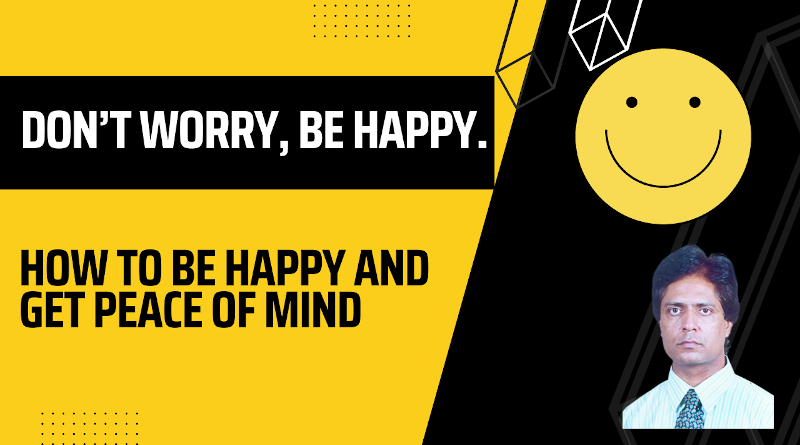How to Be Happy and Get Peace of Mind: Watch Video

How to Be Happy and Get Peace of Mind: Watch Video
Don’t Worry, Be Happy. But How?
You can’t try and feel happy because happiness and sadness are two temporary states of mind, as your mind keeps fluctuating between these two states.
By Rakesh Raman

“Don’t Worry, Be Happy” is a popular song of 1988 by musician Bobby McFerrin. But its title is fit only for the song, not for real life. Although everybody wants to stop worrying and be happy, actually no one can. All humans are more worried than they’re happy.
You can’t try and feel happy because happiness and sadness are two temporary states of mind, as your mind keeps fluctuating between these two states. There is no reasoning for happiness and ordinarily it’s not in your control to stay happy even for a few moments.
You would have experienced that you can be happy when you don’t have anything and you can be sad when you have everything with you. So, happiness doesn’t come with the riches, happiness is not correlated with your status, and happiness is not a factor of deity worship.
Then what’s happiness? It’s an abstract feeling and relative in nature. The feeling of happiness comes when your mind thinks about your relative condition of sadness. You would have seen that all types of people – however poor or rich they may be – have their moments of happiness and sadness. Even crippled, beggars, prisoners, orphans, all feel happy as well as sad.
And the proportion of happiness and sadness in a human being’s life is same for all individuals irrespective of their social or economic status. If there were an instrument to measure happiness and sadness for people, it would show exactly the same degree for every person in their lifetime.
However, you will find that for almost everyone, the amount of sadness in life is far greater than happiness. That’s also said by the Indian saint Buddha in “Buddha’s Four Noble Truths.”
In this order, the four truths are: life is full of sufferings (which means sadness), these sufferings have a cause, sufferings and the cause of sufferings can be controlled, and there is a way to control the sufferings.
All these four truths have a very intricate, deep meaning. You need plenty of spiritual knowledge to understand the cause of your sufferings. There will be only a handful of people in the world who have that kind of knowledge – may be one person in one billion.
The knowledge of spirituality doesn’t come with conventional education or religious beliefs. Rather, it comes with your day-to-day experiences and your approach to handle those experiences. With this knowledge, if you are able to know the cause of your sufferings, it won’t be easy for you to apply the way that can control your sufferings.
Going by this reasoning, you can say that there would hardly be any person in this world who can practice the right ways to minimize their sufferings and stay happy. This is evident in the world around us. Everyone that we know closely is more sad than happy. If you find people smiling and laughing, that won’t mean they are happy.
Smiles have no connection with happiness. You can experience happy moments even without smiling. But in his fourth noble truth, Buddha said that there are ways to reduce your sufferings. How can we do that?
You can do that if you have complete control on your mind. You need to go beyond happiness to achieve happiness. That is a state of peace where you neither feel happy nor sad. It’s a different feeling of satisfaction or contentment. Very few can go on the path of peace. In the past 2,500 years, as I know after my constant study, only Buddha (also known as Gautama Buddha) could tread that path and attain peace.
It’s an uphill task for normal human beings to practice and reach the state of peace because they can’t think beyond happiness which doesn’t even exist in the real world. All wishes like Happy Birthday, Happy Anniversary, Happy New Year, etc. are meaninglessly designed around happiness.
As they lack knowledge, people think about peace only after death when they say requiescat in pace (or rest in peace or RIP) while peace is actually a phenomenon during the lifetime of a person. When you are at peace, you won’t even need happiness.
But can you attain peace? Can’t say. But you can surely try for it. The first and the only step to attain peace is detachment. To practice detachment, never feel excited when you get something and never feel sad when you lose the other.
You must understand that all your possessions are temporary; so you need not celebrate them. And since either your possessions will leave you or you will leave them, you need not worry about them. These possessions may be your family, your relatives, your friends, your house, your car, your job, your wealth, and all other material objects.
Your biggest source of happiness can soon be the worst cause of sadness because you can’t control the nature and your destiny. But you can still try and control your mind. It will be a difficult exercise, but by practicing detachment, you can hope to succeed to some extent at least. Even a little degree of success can provide you some flavor of peace when you won’t yearn for happiness. Believe me.
By Rakesh Raman, who is a national award-winning journalist and social activist. He is the founder of the humanitarian organization RMN Foundation which is working in diverse areas to help the disadvantaged and distressed people in the society.





